
Related
Topics
In a Democracy Now U.S. broadcast exclusive, we air an interview with Syrian President Bashar Al-Asad. He spoke with independent journalist Reese Erlich last month in Damascus in a wide-ranging interview on United States foreign policy, resistance to the occupation of Iraq, Syrian relations with Lebanon and much more. [includes rush transcript]
As the bombardment of Lebanon continues, the United States and Israel have been calling on Syria to pressure Hezbollah to back down and release the two captured Israeli soldiers.
On Monday President Bush was caught on tape speaking privately to British Prime Minister Tony Blair. On the tape, he curses and blames Syria for the current crisis. Meanwhile, former CIA Director James Woolsey, appeared on Fox yesterday to call for US air strikes against Syria.
Damascus has warned that it will respond in a “unlimited” manner to any Israeli attacks on the country. Meanwhile, a massive pro-Hezbollah rally was held in Damascus yesterday.
Today, a Democracy Now U.S. broadcast exclusive: An interview with Syrian President Bashar Al-Asad. Last month, he gave a wide-ranging interview to independent journalist Reese Erlich in Damascus. Erlich is a freelance foreign correspondent who reports regularly for CBC, ABC Australia, Radio Deutche Welle and National Public Radio. He also co-author of the book “Target Iraq: What the News Media Didn’t Tell You”
In the interview, Asad discusses United States foreign policy, resistance to the occupation of Iraq, Syrian relations with Lebanon and much more.
- Bashar Al-Asad, president of Syria interviewed by freelance foreign correspondent Reese Erlich on June 14, 2006.
We get response on Bashar Al-Asad’s comments from British journalist Patrick Seale, a British journalist who has covered the Middle East for over 30 years. He is the author of the definitive biography of Bashar Al-Asad’s father Hafez, titled “Asad: The Struggle for the Middle East”
- Patrick Seale, British journalist who has covered the Middle East for over 30 years. He is the author of “Asad: The Struggle for the Middle East”
Transcript
AMY GOODMAN: On Monday, President Bush was caught on tape at the G8 summit speaking privately to the British Prime Minister Tony Blair. On the tape, he curses and blames Syria for the current crisis.
PRESIDENT GEORGE W. BUSH: See, the irony is that what they need to do is get Syria to get Hezbollah to stop doing this s*** and it’s over.
AMY GOODMAN: Meanwhile, former CIA director, James Woolsey, appeared on FOX yesterday to call for U.S. air strikes against Syria. Damascus has warned that it will respond in a “unlimited manner” to any Israeli attacks on the country. Meanwhile, a massive pro-Hezbollah rally was held in Damascus yesterday.
Today we bring you a Democracy Now! U.S. broadcast exclusive, an interview with Syrian President Bashar Al-Asad. Last month he gave a wide-ranging interview to independent journalist, Reese Erlich, in Damascus. Erlich’s a freelance foreign correspondent, reports regularly for CBC, ABC Australia, Radio Deutsche Welle, National Public Radio. Reese Erlich is also co-author of the book Target Iraq: What the News Media Didn’t Tell You, and he now joins us from San Francisco. Welcome to Democracy Now!, Reese.
REESE ERLICH: Thanks very much, Amy.
AMY GOODMAN: Can you talk about this interview that we’re about to play? What were the circumstances of it? Where did you interview the President of Syria?
REESE ERLICH: I interviewed him at the presidential palace, up on a hill above Damascus, where he has his formal meetings. It’s a very impressive place. You go in, and you have about eight miles of red carpet and huge doors, and it’s quite an impressive entrance. And then, out of a little room comes the President of Syria and welcomes you in and shakes your hand. He’s a very friendly guy. I’ve had an opportunity to interview presidents from a number of different countries, and most of them are rather stiff and formal. He was very informal, easy to talk to, was forthcoming in the interview. And we talked about a whole range of issues, from Iran and Syria and U.S. relations and terrorism down to issues of democratic rights inside Syria.
AMY GOODMAN: I want to turn to the first part of that interview right now, where, Reese Erlich, you started by asking President Bashar Al-Asad if he was concerned the United States might also be considering Syria as a target for military action. Mind you, this is before the current conflict. You asked him if the U.S. might also consider Syria as a target. This is the President of Syria answering.
PRESIDENT BASHAR AL-ASAD: Actually, Syria has a history of 5,000 years, and it made its history, it makes its presence, and it will make its future. The people in Syria will decide who’s going to be in charge, who’s going on the helm and who’s not. But the most important thing, whoever think about destabilizing Syria, he should know that he’s going to destabilize the region. We are the safety valve in the region.
REESE ERLICH: The safety valve?
PRESIDENT BASHAR AL-ASAD: Yeah, safety valve in the region.
REESE ERLICH: What way? How?
PRESIDENT BASHAR AL-ASAD: In a geopolitical way. Geopolitical way. The history of Syria, the road of the Syria and the region, the link between Syria and our neighbors, social links, ideological links, and the interest links with the region. So the whole region is connected with each other.
REESE ERLICH: You mentioned that in the past Syria has helped provide intelligence about terrorist groups, al-Qaeda and so on. Explain that. And when did that cooperation end?
PRESIDENT BASHAR AL-ASAD: Actually, we started cooperating with the United States — we took the initiative to cooperate with the United States intelligence after 11th of September. And we succeeded in preventing more than seven plots made by al-Qaeda against the United States. The cooperation stopped last March 2005, because of mistakes were made by the United States, first; second, because of their political position or stand against Syria.
REESE ERLICH: What were the mistakes made by the United States?
PRESIDENT BASHAR AL-ASAD: Technical mistakes that led to losing many opportunities to go forward in fighting terrorism in the region.
REESE ERLICH: That was also around the time in which the U.S. was pressuring Lebanon to demand the return of Syrian troops and the charges about Hariri, and so on and so forth. So, did that, in general, sour the political atmosphere?
PRESIDENT BASHAR AL-ASAD: Definitely, definitely.
REESE ERLICH: Do you think the Bush administration will militarily attack Iran, using the issue of nuclear weapons development, supposedly, that Iran is involved in? Do you think that’s likely?
PRESIDENT BASHAR AL-ASAD: Anyway, it’s a hypothetical question, but if we want to talk about logic and the interest of the region and of the United States and the rest of the world, it’s not to do such a thing, because the whole world would pay a very expensive price.
REESE ERLICH: What would be the consequences if the U.S. did either try to impose sanctions or even a military strike on Iran?
PRESIDENT BASHAR AL-ASAD: Sanctions won’t do anything, from the experience in Iraq, in many different countries. Sanctions won’t do anything. But the consequences of destabilizing the region by sanctions, by military actions, by any kind of means, will lead to destabilizing the whole Middle East.
REESE ERLICH: Iran has a number of options, should something like that happen. For example, it can work with its supporters in Iraq to attack U.S. forces, when they’re not doing that now. It has influence with Hezbollah, and it could inflame the situation there. Do you think those would be some of the examples of the destabilization?
PRESIDENT BASHAR AL-ASAD: I think the question should be, as to the Iranian, I mean, both, they’re going to do. But for me, the consequences are much deeper, if you look at Iraq as an example. You cannot talk about factions or parties or groups. It’s much more deeper than this. It’s chaos. It’s going to be a total chaos.
AMY GOODMAN: Reese Erlich interviewing the President of Syria. We’re going to go back to that interview, joined by Reese Erlich in studio in San Francisco and Patrick Seale, British journalist who’s covered the Middle East for over 30 years, who wrote the biography of Asad called Asad: The Struggle for the Middle East.
Patrick Seale, I wanted to go to you in France right now to give us a little background on Asad, on the President of Syria, and to also your response to this first part of the interview.
PATRICK SEALE: Well, as you know, he’s been in power for about six years now. He took over from his father, when his father died in June 2000. He is an eye doctor, trained as an eye doctor in Britain and in Syria. He wasn’t really prepared for power, so he’s had a rather hard innings, particularly, of course, since the attack on Iraq by the United States, which is probably go down in history as a monumental blunder. Nevertheless, he has proved a very tough defender of Syrian interests, and it’s striking that he should make this claim, that whoever — that to destabilize Syria is to destabilize the whole region. I think that’s really, in a way, one of his key remarks. He points to his concern and his attempt to persuade the world that Syria has an important regional role and continues to have that role.
AMY GOODMAN: Can you give us more on the background, Patrick Seale, of how Bashar Al-Asad rose to power? And then, also, if you could talk about the reference to Rafik Hariri, the Lebanese leader who was assassinated last year.
PATRICK SEALE: Well, he rose to power — in a way, it was a sort of joint decision of the political elite in Damascus after his father died. He seemed a natural candidate, and in fact his father had, I think, to some extent, prepared him for this task in the six years since his elder brother, Basil, died in a car crash. His elder brother, Basil, was the acknowledged heir. When he died, then they recalled Dr. Bashar from London, where he was studying ophthalmology, and he was then trained to succeed his father. As I said, it’s not been an easy problem.
Now, the Lebanon is vitally important for Syria’s security. Syria cannot tolerate a hostile power in the Lebanon, and this, I think, lies at the root of much of Syria’s policy. If you may recall that in 1982, Israel invaded Lebanon, killing about 17,000 Lebanese and Palestinians and attempting to bring Lebanon into its orbit with the help of the United States. George Shultz, at the time, the American Secretary of State, tried to broker a separate peace between Israel and Lebanon, which would have put Lebanon in Israel’s sphere of influence, and the Israelis were anxious to install a puppet government in Beirut, which would do their bidding.
Now, the Syrians managed to overturn that accord and bring Lebanon back into their sphere of influence, which, as I said, is necessary for their security, but is also a reflection of the numerous ties between the two countries. They are tied, intimately tied, by the family ties, trade ties, financial ties and, of course, historical ties. So for all these reasons, Syria has a very strong interest in the Lebanon.
Now, we don’t know whether or not Syria killed the former prime minister of Lebanon, Rafik Hariri. The investigation into that matter is still continuing, and indeed into the murders which followed. Many people have pointed the finger at Syria and have argued that Rafik Hariri wanted to change the relationship between the two countries. But, as I say, it remains unproven to this day.
AMY GOODMAN: I want to talk to you about the cooperation between Syria and the United States, but first, we’re going to go back to the interview. Again, this is an interview done before the current conflict. Independent reporter Reese Erlich in this Democracy Now! U.S. broadcast exclusive, speaking to the President of Syria, Bashar Al-Asad.
REESE ERLICH: Does Syria plan to demarcate its borders with Lebanon — and then, a second related question — or open embassies between the two?
PRESIDENT BASHAR AL-ASAD: The first part about the borders, we had a letter, formal letter, from the Lebanese prime minister, and we sent him a reply, formal reply, that we are ready to demarcate the borders. We don’t have any problem, because we had such a problem with Jordan a few years ago, and we solved it.
About the embassies, as a concept, we cannot say we don’t want to have an embassy in another country, as a concept, but that needs normal relation. Now, we don’t have this normal relation with the Lebanese, so it needs better relation to discuss this issue.
REESE ERLICH: What kinds of issues would have to be resolved in order to have a normal relation?
PRESIDENT BASHAR AL-ASAD: First of all, not to have a government that works against your country. This is first of all. And second of all, you need the Syrians to feel that they have real neighbors, not cradle for or not a hub for terrorists to come and do such terrorist acts in Syria.
REESE ERLICH: One last question, what would it take to improve relations between the United States and Syria now? Are there any steps that could be taken that would improve them?
PRESIDENT BASHAR AL-ASAD: Definitely by the United States, not by Syria, because we did a lot, and we couldn’t get any result, because they don’t have the will. So first of all, they should know and they should understand the situation in the region. They should appreciate the role of Syria in the region. They should know that we have common interests that they don’t see. And I think they should be neutral in dealing with our causes. That’s how we can get back our relation to normal.
REESE ERLICH: So, do you want to be any more specific about your causes and [inaudible]?
PRESIDENT BASHAR AL-ASAD: Yeah, definitely. The most important thing, our occupied land, Golan Heights. The United States should take into consideration that we see everything in Syria through our occupied land. Without talking about peace process, in order to get this land back, what the benefit of this relation?
REESE ERLICH: Anything else you would like to add, in a message to the American people?
PRESIDENT BASHAR AL-ASAD: I think after the 11th of September, which was a very tough lesson, not to the United States people, to everybody in this world, first of all, you should learn more about what’s going on behind the ocean, all over the world. You should send more people, more delegations to meet with other cultures to discuss with them, to know the facts, not to be isolated away from the rest of the world.
AMY GOODMAN: Syrian President Bashar Al-Asad. When we come back from break, he will talk about the war in Iraq, and we’ll continue with our conversation with Patrick Seale, who wrote the biography of Asad, called Asad: The Struggle for the Middle East. And we’ll also speak with Reese Erlich, who did the interview with the Syrian president in Damascus.
[break]
AMY GOODMAN: We’ll continue our interview that we’re bringing you in this U.S. broadcast exclusive. Independent journalist Reese Erlich was in Damascus last month and interviewed the President of Syria, Bashar Al-Asad. We’re also joined on the telephone by Patrick Seale from France, who wrote the biography of Asad’s father. It’s called Asad: The Struggle for the Middle East. Patrick Seale, as you listen to this interview and hear Bashar Al-Asad talk about the United States, can you comment on the relationship that Asad has had with the United States, as well as Lebanon?
PATRICK SEALE: Well, Syria has — there’s a terrible noise on this line. Can you hear it?
AMY GOODMAN: We can hear the sound, but we can also hear — we can hear you.
PATRICK SEALE: Can you hear me?
AMY GOODMAN: Yes, I hear you fine.
PATRICK SEALE: Well, it’s incredible noise. One second, please.
AMY GOODMAN: We can hear you, if you can try to ignore the sound. We can hear you fine.
PATRICK SEALE: Well, Syria has always sought better relations with the United States. Now, it’s suffered very much from what it considers America’s alignment on Israel. Indeed, it’s striking that President Bashar should urge the United States to be more even-handed, more neutral in its approach to the Middle East, not only, of course, on the Palestinian question, but also on the subject very dear to Syrian hearts, the occupied Golan. Now, as you know, Israel occupied the Golan in 1967, and the United States, in spite of Security Council Resolutions 242, 338, has allowed that occupation to stand, as it has allowed the occupation of Palestinian territories to stand for the last 39 years. The United States allowed Israel to occupy Lebanon, Southern Lebanon, for 22 years, and occupy the Palestinian territories for 39 years. Now, these are the reasons why many, many Arabs are very disgruntled, very hostile to the United States. Now, the United States believes that Israel can use force to protect its own supremacy in the region, but this is increasingly contested.
And so, in terms of President Bashar Al-Asad, he made very clear that Syria cannot tolerate the use of Lebanon to mount hostile operations against Syria. That’s when he was answering the question about why not restore — have an exchange of embassies, have diplomatic relations with Lebanon. He said, 'Well, we could do that once we have normal relations and once we have a Lebanese government in Beirut which doesn't work against Syria or cooperate with its enemies.’ So he was very clear on all those issues, and his appeal to the United States was to understand the region better, understand that there are other countries in the region, apart from Israel, with whom the United States has common interests, and should recognize those interests.
AMY GOODMAN: Pulitzer Prize-winning journalist Seymour Hersh detailed several years ago how the Bush administration destroyed U.S.-Syrian relations by attacking a convoy of cars inside Syria in an attempt to assassinate Saddam Hussein. It turned out the convoy was made up of cars that were smuggling goods out of Iraq, and Syria has since stopped cooperating with the United States.
PATRICK SEALE: Well, that’s true. It wasn’t just that. I mean, Syria, like many other countries in the world, like France, like Germany, was very much opposed to the attack on Iraq. The Syrians had no love for Saddam Hussein, but the idea that the United States should attack — I mean, an unprovoked attack against a major Arab country — and smash it and kill tens of thousands of people, and then accuse Syria, of all countries, of interfering or Iran of interfering, when the United States, which previously had opposed, over the horizon, of keeping away from the heartland of the Middle East, suddenly makes this qualitative leap of attacking a major Arab state, this has caused consternation in the region.
And, of course, the Syrians feel threatened. They feel that they may be next. At least they felt that in the earlier stages of the attack. Now, I think they feel a bit more confident, because of the quagmire in which the United States finds itself. I mean, it looks very much as if the neo-cons, the pro-Israeli neo-cons, in influential positions in the U.S. administration took the United States for a ride. They involved it in this attack on Iraq, no doubt believing this would improve Israel’s strategic environment. But this has proved to be a catastrophe for the United States, extremely costly in men and treasure.
AMY GOODMAN: Patrick Seale, we’re going to go back to the interview that independent journalist Reese Erlich did with the President of Syria, Bashar Al-Asad, last month, again, before the current conflict.
REESE ERLICH: President Bush made a surprise visit to Baghdad today, or yesterday and today. Zarqawi was killed. Do you think that — the Bush administration is trying to say that they’re making progress now in Iraq. Do you think — well, first of all, do you think that’s accurate, or do you think the U.S. in some ways has actually already lost the war?
PRESIDENT BASHAR AL-ASAD: Lost the war and making progress are linked together, so have to ask about the goal first. So you have goal, democracy, the answer is very clear: the situation is much worse than before, even during Saddam’s, that we don’t defend in Syria. If they talk about better living standards, the situation much, much worse than before. If they are talking about development, about infrastructure, about anything, so everything is worse. So that depends on what the goal of the war.
You cannot talk about occupation. I mean, occupation is not the goal of the war. This is the mean, occupation. But if we talk about the military side of the war, killing Americans every day in Iraq, and, of course, killing Iraqis, tens of Iraqis every week, is that the goal of the war from the military point of view? I don’t think so. The answer is very clear for us.
REESE ERLICH: But even in a military sense, the U.S. no longer controls certain areas of Iraq. It’s very unstable, even in the south, in the Basra area. It would seem that even from a strictly military standpoint, the situation has gotten worse from the U.S. Do you think that’s true?
PRESIDENT BASHAR AL-ASAD: It’s self-evident. No power, no military power in the world, even the United States, can control a small country militarily. You can only control a country if the people wants you to control it. When the people are against you — and this is very normal to have the people against the occupation in Iraq and in any other country — you are going to have resistance, and you will not control anything. This is normal.
REESE ERLICH: What do you think the outcome is going to be, if you said a few years from now, what do you think the situation will look like in Iraq?
PRESIDENT BASHAR AL-ASAD: That depends on the constitution, first of all. You need consensus. If you want to talk about the future of Iraq, we should talk about a consensus about something, and normally the future of Iraq is going to be inside the constitution. So far, according to what we hear from many Iraqi factions, some factions think they are oppressed, so this needs to be re-evaluated. I think this is at the core of the future. If there’s no consensus about the constitution, you will have conflict or maybe a civil war. This is the core, not having a new government or having some relation. This is good, we support in Syria. We support the political process, but this is not enough. This is for the short term, it’s okay. For the long term, no, it’s not enough.
REESE ERLICH: Sources have told me you’ve been involved in promoting some negotiations between the Sunni resistance and the government. Is that accurate?
PRESIDENT BASHAR AL-ASAD: Actually, what we tried to promote is the unified Iraq. This is the only thing. We tried to see what’s in common between the whole Iraqis, and we tried to make some negotiations, some marketing, some ideas that the Iraqi would think it helps unifying Iraq or keep it unified, so far. And this is how we put our role as, in general.
REESE ERLICH: But, specifically, have you helped facilitate some talks between the resistance, the people opposed, fighting the United States, and the Iraqi government?
PRESIDENT BASHAR AL-ASAD: Actually, there’s a delegation that comes to Syria. We don’t know if they are resistance or not. They are Iraqis. And they don’t know — nobody knows who are the resistance. Only the Iraqis. So don’t believe if anyone tells you that he knows what the resistance? So, but definitely, most of them, most of the Iraqis that we meet, they are supporting the resistance, at least politically.
REESE ERLICH: And are you trying to facilitate the political supporters to hold negotiations with the government?
PRESIDENT BASHAR AL-ASAD: Yeah, we always say that we are ready to help in any way, but definitely Syria is open for this, and we tried to. Yeah, we did some effort.
REESE ERLICH: There’s been recent deaths on the beach in Gaza. Hamas has ended its ceasefire with Israel. What is your — it seems like a very great struggle is re-emerging now in Palestine. What is your prediction for the next short-term period in Palestine?
PRESIDENT BASHAR AL-ASAD: You mean the Palestinian-Palestinan relation or Palestinian —
REESE ERLICH: Palestinian-Israeli relations, yeah.
PRESIDENT BASHAR AL-ASAD: Of course, when you have conflict between the Palestinians, you won’t have a peace talk in the near future. So I’m talking about — I’m talking from the West’s point of view now. From our point of view, it’s something — between the Palestinians, it’s something humanitarian, that we consider them as brothers.
But I think the Palestinians are paying the price of Oslo, treaty in 1993, and this is first. Second, they paid the price of the paralyzed peace process, especially after the 2000 negotiation at Camp David and the deadlock that they reached between the Palestinian and the Israeli and the negligence of the American administration of the peace process, in general.
AMY GOODMAN: The President of Syria, Bashar Al-Asad, speaking with independent journalist, Reese Erlich. We’re going to go to him in a minute, but I wanted to ask Patrick Seale quickly, in France, about how much control you think Syria has over Hezbollah in Lebanon now.
PATRICK SEALE: Hezbollah is, of course, its ally, as it is the ally of Iran. This doesn’t mean that it has full control over Hezbollah. Hezbollah has become an autonomous player, particularly ever since it managed to expel the Israelis from Lebanon, from most of Lebanon, in the year 2000. Of course, Israel continues to occupy a small area known as the Shebaa Farms on the pretext that they actually belong to Syria, rather than Lebanon. Syria says, no, these are Lebanese. But nevertheless, the Israelis maintain their occupation there and, of course, are holding a lot of prisoners. Now, both the Hamas attack, in which was captured an Israeli soldier, and Hezbollah’s attack, which captured two Israeli soldiers, these were intended to act — to serve as bargaining quarters to force Israel to release some of the many, many prisoners it holds. It holds about 10,000.
AMY GOODMAN: Patrick Seale, we’re going to leave it there for today. We’re going to play more of the interview tomorrow. Reese Erlich, we have 30 seconds. Your final comment today on this part of the interview you did with the Syrian president.
REESE ERLICH: Well, I think it’s clear that he has accurately portrayed the difficulties the U.S. faces in Iraq. It’s an unwinnable war. Hundreds of thousands of refugees are fleeing Iraq to live in Syria, including 18,000 Christian Iraqis, who have fled as a result of their churches being attacked and their communities being attacked, something that even Saddam Hussein never dared to do.
AMY GOODMAN: Reese Erlich, I want to thank you for sharing this interview. We’ll play more of it tomorrow. Reese Erlich, independent journalist, recently back from Syria. And Patrick Seale, author of Asad: The Struggle for the Middle East. Tomorrow, again, part two of the interview.

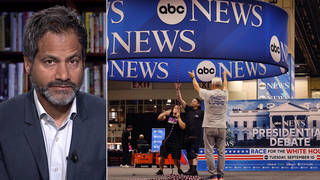
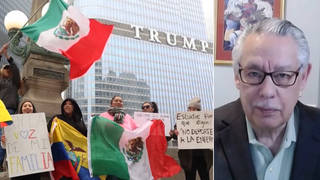
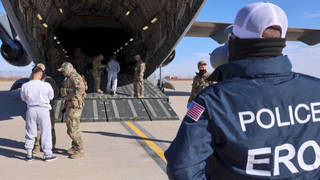
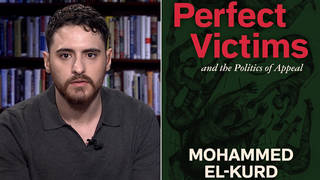

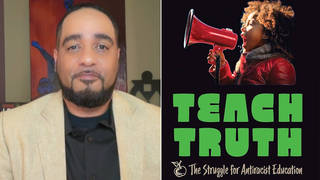




Media Options